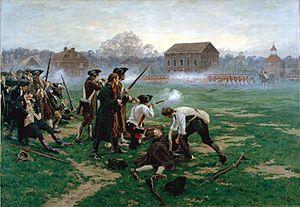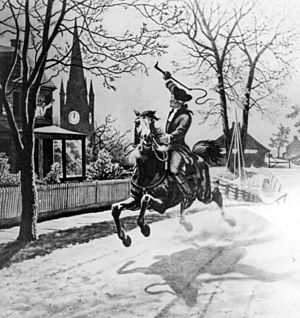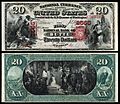Battles of Lexington and Concord facts for kids
Quick facts for kids Battles of Lexington and Concord |
|||||||
|---|---|---|---|---|---|---|---|
| Part of the American Revolutionary War | |||||||
 A painting of the Battle of Lexington from 1910 |
|||||||
|
|||||||
| Belligerents | |||||||
| Massachusetts Bay | |||||||
| Commanders and leaders | |||||||
| John Parker James Barrett John Buttrick John Robinson William Heath Joseph Warren Isaac Davis † |
Francis Smith John Pitcairn (WIA) Hugh Percy |
||||||
| Strength | |||||||
| Lexington: 77 Concord: 400 End of Battle: 3,960 |
Departing Boston: 700 Lexington: 400 Concord: 100 End of Battle: 1,500 |
||||||
| Casualties and losses | |||||||
| 49 killed 39 wounded 5 missing |
73 killed 174 wounded 53 missing |
||||||
The Battles of Lexington and Concord were the very first battles of the American Revolutionary War. These fights happened between British soldiers and American colonists. The British wanted to find and take away the colonists' weapons. They also planned to arrest two important leaders, John Hancock and Samuel Adams.
The battles took place on April 19, 1775. They were fought in towns near Boston, Massachusetts. These towns were Lexington and Concord. The American colonists, called Patriots, learned about the British plan ahead of time. This allowed them to move their supplies and leaders to safety.
Contents
The Battle of Lexington
The first fight happened on Lexington Green in Lexington. About 700 British soldiers, led by General Gage, marched there. Their goal was to find and destroy hidden weapons.
However, they were met by about 70 American minutemen. Minutemen were colonists ready to fight in a minute's notice. The battle was very short, lasting only a few minutes. Eight minutemen were killed and nine were hurt. Only one British soldier was injured.
After this brief fight, the British soldiers continued their march. They headed towards Concord. Their mission was to seize supplies like food, guns, and ammunition. These supplies were stored by the American militia.
The Battle of Concord
When the British reached Concord, they found some supplies. They destroyed what they could. However, many supplies had already been moved by the Patriots.
On their way back to Boston, the British faced a big surprise. About 400 minutemen ambushed them. This time, the fight was much harder for the British. They lost 250 soldiers. The Americans lost 90 soldiers.
Why These Battles Mattered
These battles were the start of the American Revolutionary War. This was a major armed conflict between the Kingdom of Great Britain and the American colonists. The colonists were from America's thirteen colonies.
The first shot fired by the Patriots at the North Bridge is very famous. Ralph Waldo Emerson called it the "shot heard round the world" in his poem "Concord Hymn". This phrase means the event had a huge impact globally.
Interesting Facts About the Battles
- The Midnight Ride was a famous event before the battles. Paul Revere rode to warn the American militia. He alerted them that British forces were coming. This happened in April 1775.
- Paul Revere did not shout “The British are coming!” as some stories say. He was on a secret mission.
- Paul Revere was not the only rider. William Dawes and Samuel Prescott also rode to Concord.
- Both Revere and Dawes were captured by the British. Only Samuel Prescott made it to Concord with the warning.
- The "shot heard round the world" is a well-known phrase. It refers to the first shot of the battles of Lexington and Concord. This shot started the American Revolutionary War on April 19, 1775.
Images for kids
-
Margaret Kemble Gage may have given secret information to the American rebels.
-
Silversmith Paul Revere and other messengers rode to warn the colonists.
-
1775 map of the battles and of the siege of Boston
-
The Jason Russell House in Arlington.
-
Gravemarkers along Battle Road in Lexington. They show Britain's 1775 flag.
-
Daniel Chester French's The Minute Man, 1874.
-
Citizens of Acton marching to Concord during the 2016 Patriots' Day celebration.
See also
 In Spanish: Batallas de Lexington y Concord para niños
In Spanish: Batallas de Lexington y Concord para niños
























